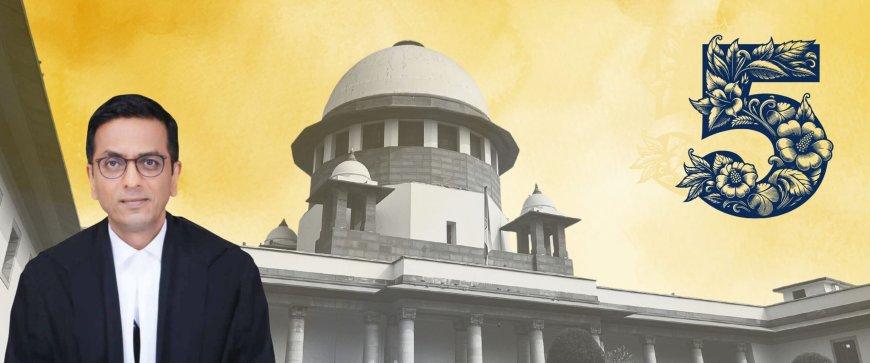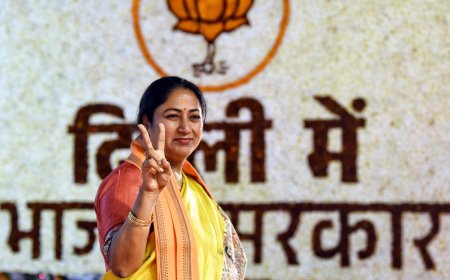Landmark Constitutional Rulings by Justice DY Chandrachud
Explore the major constitutional rulings led by Justice DY Chandrachud, highlighting his influence on India's judicial landscape and transformative legal principles

Landmark Constitutional Rulings by Justice DY Chandrachud
Justice DY Chandrachud has emerged as one of the most influential figures in India's judicial landscape, delivering rulings that have redefined constitutional rights, social justice, and the scope of individual freedoms. His judgments reflect a deep commitment to the values enshrined in the Indian Constitution, with a focus on inclusive growth, personal freedoms, and balancing state power with citizen rights.
Let’s dive into some of Justice Chandrachud’s most notable constitutional rulings, examining how they’ve impacted Indian law and society.
1. Upholding the Right to Privacy
- Case: Justice Chandrachud played a pivotal role in the landmark K.S. Puttaswamy v. Union of India case, where the Supreme Court unanimously recognized the right to privacy as a fundamental right under the Indian Constitution.
- Significance: This judgment emphasized privacy as a core aspect of individual dignity and autonomy, paving the way for data protection laws in India.
- Outcome: With this ruling, privacy was established as an essential right under Article 21, strengthening citizens' ability to guard against state interference.
2. Decriminalizing Section 377 and Promoting LGBTQ+ Rights
- Case: In the case of Navtej Singh Johar v. Union of India, Justice Chandrachud supported the landmark judgment decriminalizing homosexuality, declaring Section 377 unconstitutional.
- Impact: This decision not only advanced LGBTQ+ rights but also underscored the need for dignity and equality for all citizens.
- Implications: The ruling reinforced India's commitment to personal freedoms, creating legal recognition for the rights of LGBTQ+ individuals and promoting inclusivity.
3. Affirming the Right to Choice in the Sabarimala Case
- Case: Justice Chandrachud’s judgment in Indian Young Lawyers Association v. State of Kerala supported allowing women of all ages to enter the Sabarimala temple, contesting the traditional ban on women of reproductive age.
- Significance: This judgment challenged societal norms, emphasizing gender equality and individual choice in matters of religious practices.
- Outcome: While the verdict sparked debate, it set a precedent on gender rights within religious spaces, promoting the idea that constitutional rights should supersede traditional restrictions.
4. Advocating for Social and Economic Rights in the Aadhaar Judgment
- Case: In Justice K.S. Puttaswamy (Retd) v. Union of India, Justice Chandrachud dissented on key aspects of the Aadhaar judgment, voicing concerns about privacy and the mandatory linking of Aadhaar to essential services.
- Significance: Though in the minority, his dissent argued for the importance of privacy in welfare schemes, critiquing Aadhaar’s potential overreach.
- Legacy: Justice Chandrachud’s dissent highlighted concerns about surveillance and the need for strict data protection laws, influencing later debates on privacy in India.
5. Reinterpreting Adultery Laws in Favor of Equality
- Case: In Joseph Shine v. Union of India, Justice Chandrachud played a role in overturning Section 497, which criminalized adultery only for men.
- Impact: This ruling held that the law violated equality by treating women as property rather than individuals with their own agency.
- Implications: The ruling reinforced gender equality in personal relationships, affirming that women should be treated as equal participants in society.
6. Emphasizing Personal Liberty in Preventive Detention Cases
- Case: In cases involving preventive detention, Justice Chandrachud has often emphasized the need for a fair balance between national security and personal liberty.
- Rulings: He has consistently advocated for strict checks on preventive detention orders, ensuring that individual freedoms are not unduly compromised.
- Significance: His approach reflects a commitment to due process, protecting individuals from potential misuse of state power.
7. Championing Free Speech in Media and Online Platforms
- Approach: Justice Chandrachud has delivered judgments supporting free speech, particularly in cases involving media freedoms and expression on digital platforms.
- Key Cases: He has been part of rulings that emphasize the right to critique and freedom of press as pillars of a democratic society.
- Implications: This emphasis on free speech upholds the right of individuals to express their views without undue fear of censorship.
8. Affirming Secularism and Minority Rights
- Case: In various judgments, Justice Chandrachud has interpreted secularism to include equal treatment and protection of minority rights, ensuring that diverse communities are respected.
- Significance: His rulings reinforce the idea that secularism is foundational to India’s Constitution and must protect religious diversity.
- Legacy: Through his interpretations, Justice Chandrachud has strengthened India's secular framework, promoting harmony and safeguarding minority rights.
9. Enhancing Women’s Rights and Workplace Equality
- Case: In rulings that address gender-based workplace discrimination, Justice Chandrachud has emphasized women’s right to equal opportunities and safe working environments.
- Focus: He has advocated for strong protections against sexual harassment and ensured that women’s rights are prioritized within professional settings.
- Outcome: These judgments contribute to fostering gender equality and empowering women to pursue careers without discrimination or bias.
10. Balancing Environmental Protection with Development
- Approach: Justice Chandrachud has also been vocal about environmental issues, aiming to balance economic growth with ecological conservation.
- Key Rulings: He has supported judgments that prevent environmental degradation while endorsing responsible development.
- Impact: This approach reflects a modern understanding of sustainable growth, encouraging a balance between development and environmental responsibilities.
Conclusion
Justice DY Chandrachud’s constitutional judgments have left a significant mark on Indian law, promoting progressive values and safeguarding individual rights. His commitment to upholding privacy, equality, and personal freedoms, along with his focus on social justice and inclusivity, has set him apart as a transformative figure in Indian judiciary. Each ruling exemplifies his dedication to a Constitution that reflects modern values while respecting India’s rich diversity.
Through these landmark rulings, Justice Chandrachud has shaped the path of Indian jurisprudence, ensuring that the law remains a guardian of individual dignity and a promoter of social equity.
What's Your Reaction?






































































